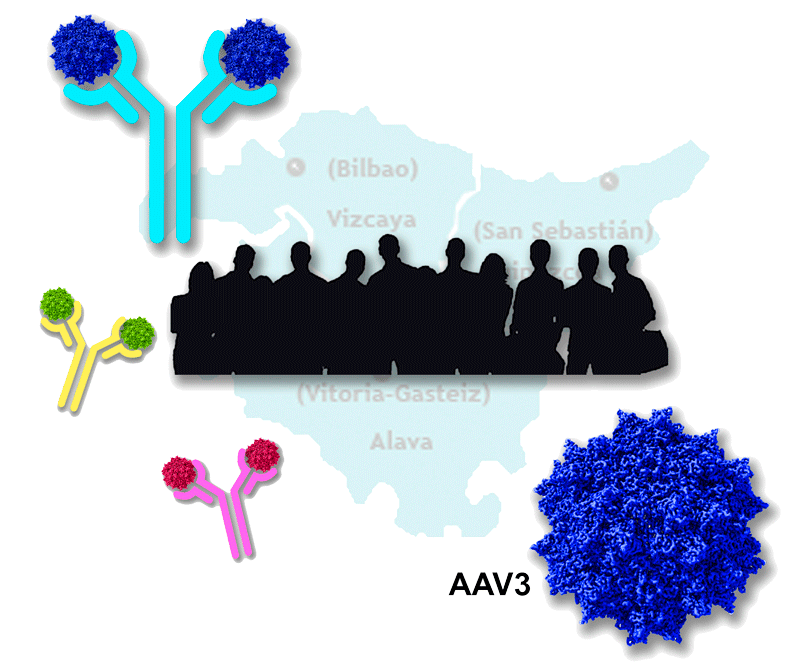
2024/07/29
New study unveils key insights into virus prevalence in the Basque population
Adeno-associated virus (AAV) a non-pathogenic virus used in gene therapies, faces challenges from preexisting antibodies, impacting treatment efficacy.
The study, recently published in Scientific Reports from Nature journal, reveals key insights into adeno-associated virus prevalence in the Basque population, crucial for developing effective gene therapies.
Researchers at CIC bioGUNE – member of BRTA – have collaborated on a study revealing crucial insights into adeno-associated viruses (AAVs) within the Basque population, marking a pivotal advancement for gene therapy. Led by Nicola G.A. Abrescia, Ikerbasque Professor and Group Leader at CIC bioGUNE's Structure and Cell Biology of Viruses Lab, their study published in Scientific Reports from Nature journal, illuminates the distribution of AAVs and their potential impact on effective gene therapies.
AAVs are increasingly utilized as carriers for gene therapies to address diverse genetic disorders. However, a significant challenge lies in preexisting neutralizing antibodies in patients, which can diminish therapy efficacy. Addressing this hurdle, Nicola Abrescia and his team provide a comprehensive profile of AAV prevalence specific to the Basque region.
The study reveals compelling findings: AAV3 predominates among Basque individuals, whereas AAV9 shows the lowest prevalence. Importantly, less than half of Basque residents possess antibodies against AAV4, AAV6, and AAV9, underscoring the necessity for tailored gene therapies in this distinct demographic.
The Basque Country's unique genetic and cultural context offers a valuable perspective compared to other European populations, aligning AAV prevalence more closely with Western European countries. This insight enhances the development of targeted gene therapies crucial for effective medical treatments.
As gene therapy gains prominence in treating genetic disorders, identifying prevalent AAV strains in specific populations aids in designing optimized treatments and inform academic research. This CIC bioGUNE's study represents a significant stride in this evolving field, emphasizing the variability in virus types that informs personalized medical approaches.
Furthermore, with global migration trends evolving, maintaining current seroprevalence data is imperative. Ongoing monitoring and research are vital to ensuring equitable access to effective gene therapies across diverse global populations.
Reference: Miguel Navarro‑Oliveros, Ander Vidaurrazaga, Gabriel Soares Guerra, Donatello Castellana, Nieves Embade, Oscar Millet, Urko M. Marigorta & Nicola G.A. Abrescia. Seroprevalence of adeno‑associated virus types 1, 2, 3, 4, 5, 6, 8, and 9 in a Basque cohort of healthy donors. Scientific Reports. DOI: 10.1038/s41598-024-66546-4.
About CIC bioGUNE
The Centre for Cooperative Research in Biosciences (CIC bioGUNE), member of the Basque Research & Technology Alliance (BRTA), located in the Bizkaia Technology Park, is a biomedical research organisation conducting cutting-edge research at the interface between structural, molecular and cell biology, with a particular focus on generating knowledge on the molecular bases of disease, for use in the development of new diagnostic methods and advanced therapies.
About Ikerbasque
Ikerbasque - Basque Foundation for Science - is the result of an initiative of the Department of Education of the Basque Government that aims to reinforce the commitment to scientific research by attracting, recovering and consolidating excellent researchers from all over the world. Currently, it is a consolidated organization that has 290 researchers/s, who develop their work in all fields of knowledge.
About BRTA
BRTA is an alliance of 4 collaborative research centres (CIC bioGUNE, CIC nanoGUNE, CIC biomaGUNE y CIC energiGUNE) and 13 technology centres (Azterlan, Azti, Ceit, Cidetec, Gaiker, Ideko, Ikerlan, Leartiker, Lortek, Neiker, Tecnalia, Tekniker y Vicomtech) with the main objective of developing advanced technological solutions for the Basque corporate fabric.
With the support of the Basque Government, the SPRI Group and the Provincial Councils of the three territories, the alliance seeks to promote collaboration between the research centres, strengthen the conditions to generate and transfer knowledge to companies, contributing to their competitiveness and outspreading the Basque scientific-technological capacity abroad.
BRTA has a workforce of 3,500 professionals, executes 22% of the Basque Country's R&D investment, registers an annual turnover of more than 300 million euros and generates 100 European and international patents per year.
See a large version of the first picture





